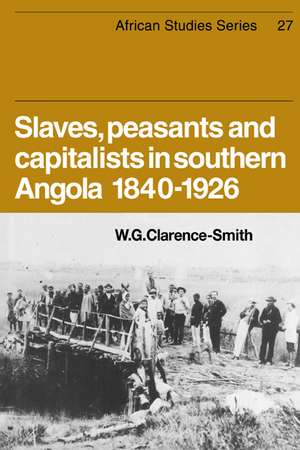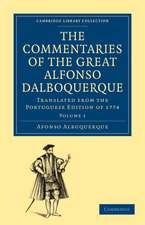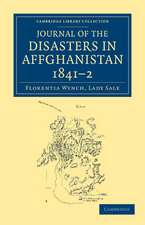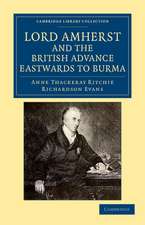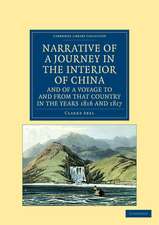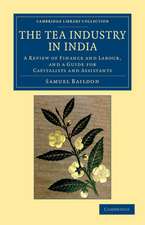Slaves, Peasants and Capitalists in Southern Angola 1840-1926: African Studies, cartea 27
Autor W. G. Clarence-Smithen Limba Engleză Paperback – 2 dec 2007
Din seria African Studies
-
 Preț: 177.35 lei
Preț: 177.35 lei - 9%
 Preț: 731.13 lei
Preț: 731.13 lei -
 Preț: 275.85 lei
Preț: 275.85 lei -
 Preț: 178.45 lei
Preț: 178.45 lei -
 Preț: 231.24 lei
Preț: 231.24 lei -
 Preț: 204.11 lei
Preț: 204.11 lei -
 Preț: 202.11 lei
Preț: 202.11 lei -
 Preț: 223.29 lei
Preț: 223.29 lei -
 Preț: 310.62 lei
Preț: 310.62 lei -
 Preț: 342.31 lei
Preț: 342.31 lei - 11%
 Preț: 696.80 lei
Preț: 696.80 lei -
 Preț: 184.93 lei
Preț: 184.93 lei -
 Preț: 238.11 lei
Preț: 238.11 lei -
 Preț: 177.35 lei
Preț: 177.35 lei -
 Preț: 208.25 lei
Preț: 208.25 lei -
 Preț: 299.45 lei
Preț: 299.45 lei - 23%
 Preț: 326.14 lei
Preț: 326.14 lei - 15%
 Preț: 459.92 lei
Preț: 459.92 lei - 15%
 Preț: 295.49 lei
Preț: 295.49 lei - 13%
 Preț: 296.11 lei
Preț: 296.11 lei - 18%
 Preț: 1007.12 lei
Preț: 1007.12 lei - 18%
 Preț: 1050.78 lei
Preț: 1050.78 lei -
 Preț: 446.37 lei
Preț: 446.37 lei - 12%
 Preț: 301.75 lei
Preț: 301.75 lei - 25%
 Preț: 770.26 lei
Preț: 770.26 lei -
 Preț: 110.05 lei
Preț: 110.05 lei - 18%
 Preț: 1106.02 lei
Preț: 1106.02 lei -
 Preț: 480.24 lei
Preț: 480.24 lei - 18%
 Preț: 1003.30 lei
Preț: 1003.30 lei - 18%
 Preț: 182.41 lei
Preț: 182.41 lei -
 Preț: 489.10 lei
Preț: 489.10 lei -
 Preț: 477.72 lei
Preț: 477.72 lei - 25%
 Preț: 853.03 lei
Preț: 853.03 lei - 18%
 Preț: 179.93 lei
Preț: 179.93 lei - 26%
 Preț: 762.16 lei
Preț: 762.16 lei - 18%
 Preț: 710.05 lei
Preț: 710.05 lei -
 Preț: 321.93 lei
Preț: 321.93 lei -
 Preț: 486.80 lei
Preț: 486.80 lei -
 Preț: 273.50 lei
Preț: 273.50 lei - 13%
 Preț: 311.00 lei
Preț: 311.00 lei - 18%
 Preț: 995.09 lei
Preț: 995.09 lei - 18%
 Preț: 703.45 lei
Preț: 703.45 lei -
 Preț: 322.12 lei
Preț: 322.12 lei -
 Preț: 287.48 lei
Preț: 287.48 lei -
 Preț: 286.69 lei
Preț: 286.69 lei
Preț: 278.24 lei
Nou
Puncte Express: 417
Preț estimativ în valută:
53.24€ • 55.74$ • 44.05£
53.24€ • 55.74$ • 44.05£
Carte tipărită la comandă
Livrare economică 05-19 aprilie
Preluare comenzi: 021 569.72.76
Specificații
ISBN-13: 9780521047432
ISBN-10: 0521047439
Pagini: 148
Ilustrații: 1
Dimensiuni: 153 x 229 x 10 mm
Greutate: 0.23 kg
Ediția:New.
Editura: Cambridge University Press
Colecția Cambridge University Press
Seria African Studies
Locul publicării:Cambridge, United Kingdom
ISBN-10: 0521047439
Pagini: 148
Ilustrații: 1
Dimensiuni: 153 x 229 x 10 mm
Greutate: 0.23 kg
Ediția:New.
Editura: Cambridge University Press
Colecția Cambridge University Press
Seria African Studies
Locul publicării:Cambridge, United Kingdom
Cuprins
List of illustrations; Preface; Note on proper names; Note on currency; Abbreviations; Introduction; 1. Land and peoples; 2. The colonial context; 3. The economy of the colonial nucleus; 4. Society and politics in the colonial nucleus; 5. The peasant economy; 6. Peasant societies; 7. Epilogue; Maps and graphs; Sources and bibliography; Index.
Descriere
This book examines the history of the colonial conquest of a neglected region of Angola from an alternative perspective.
